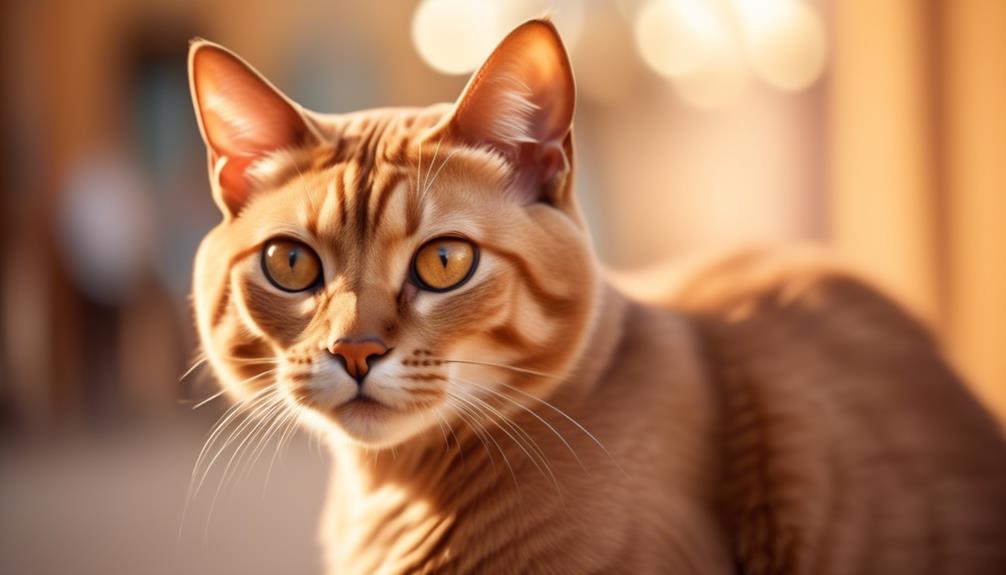
The Arabian Mau cat breed is an intriguing and captivating feline that has piqued the interest of cat enthusiasts worldwide.
With its origins deeply rooted in the Arabian Peninsula, this medium-sized landrace breed possesses a unique combination of characteristics that make it a fascinating companion.
From its sleek coat and striking ticking pattern to its intelligence and loyalty, the Arabian Mau will surely capture the hearts of those seeking a distinctive and engaging feline companion.
But what is the fascinating history behind this breed? And what are the secrets to its trainability and adaptability?
Join us as we uncover the captivating world of the Arabian Mau and explore the many facets that make it a truly remarkable breed.
Key Takeaways
- The Arabian Mau is a medium-sized cat breed from the Arabian Peninsula, with a lineage likely stretching back centuries.
- This breed has a short, sleek, spotted coat with a unique ticking pattern, commonly found in brown, silver, and black colors.
- Arabian Maus are known for their intelligent, playful, and affectionate temperament, making them a great choice for a companion pet.
- They require an active lifestyle, moderate exercise, regular grooming, and weekly brushing to maintain a healthy coat.
Origin and Size
The Arabian Mau cat breed originates from the Arabian Peninsula and is known for its medium size, typically weighing 8-12 pounds.
This landrace breed likely has a lineage stretching back centuries, with its origins traced to Saudi Arabia or the United Arab Emirates.
While its exact ancestry is uncertain, there is speculation that it may have some African wildcat heritage.
The Arabian Mau gained popularity as a domestic cat in the Middle East and was officially recognized by the World Cat Federation in 2008.
With its intelligent, playful, and affectionate temperament, the Arabian Mau makes a loyal companion. It requires moderate exercise and weekly brushing to maintain its short, sleek coat.
See another cat breed profile.
Asian Mixed Cat Breed
Breed Group and Lifespan
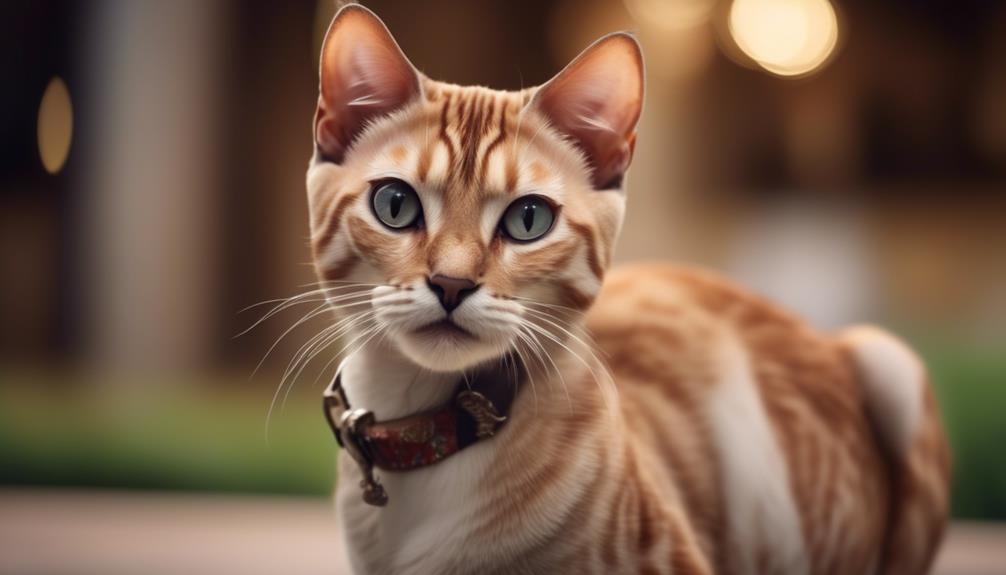
With its origins in the Arabian Peninsula and a medium size of 8-12 pounds, the Arabian Mau cat breed falls into the landrace category and has a lifespan of 12-15 years.
The breed group classification of landrace refers to a naturally occurring breed that has developed over time in a specific geographic region.
This classification highlights the Arabian Mau’s unique characteristics and environmental adaptation.
The 12-15 years lifespan is a significant factor to consider when welcoming an Arabian Mau into your family, as it ensures many years of companionship and joy.
This longevity is a testament to the breed’s overall health and well-being, making it suitable for individuals seeking a long-term feline companion.
Coat Description and Colors
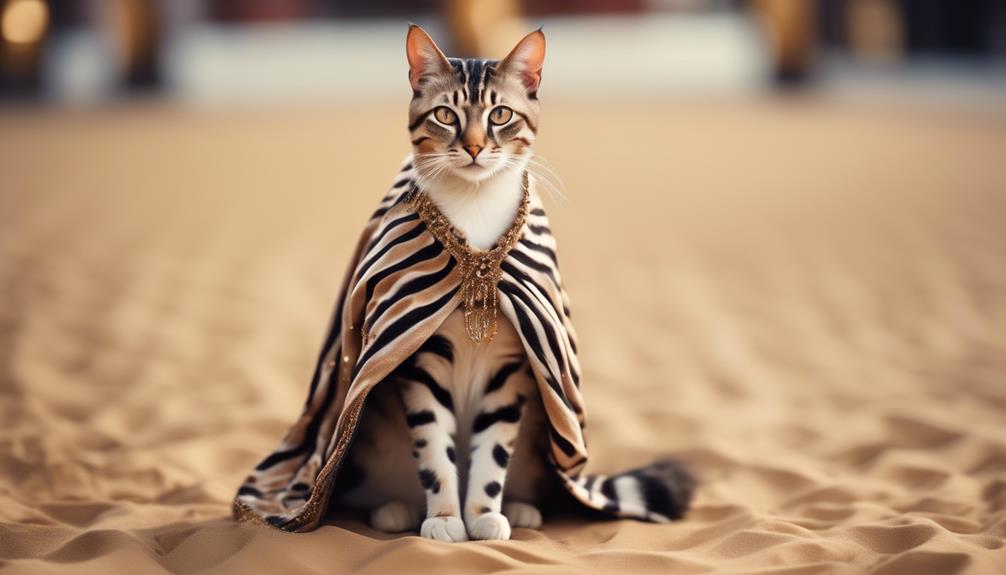
The Arabian Mau cat breed boasts a short-haired coat with a glossy appearance and comes in various stunning colors and markings.
These cats have a unique ticking pattern, where each hair has multiple bands of color, giving them a distinctive look. Common coat colors for Arabian Maus include black, white, brown, and tabby-style markings.
The coat is low maintenance, requiring brushing once or twice a week to prevent hairballs and keep the coat healthy. Arabian Maus are adaptable to most climates but prefer warmer conditions.
To provide a visual representation of the coat colors, here is a table showcasing the different options:
| Coat Colors |
|---|
| Black |
| White |
| Brown |
| Tabby-style |
With their variety of coat colors and markings, Arabian Maus are truly beautiful and unique feline companions.
Arabian Mau History
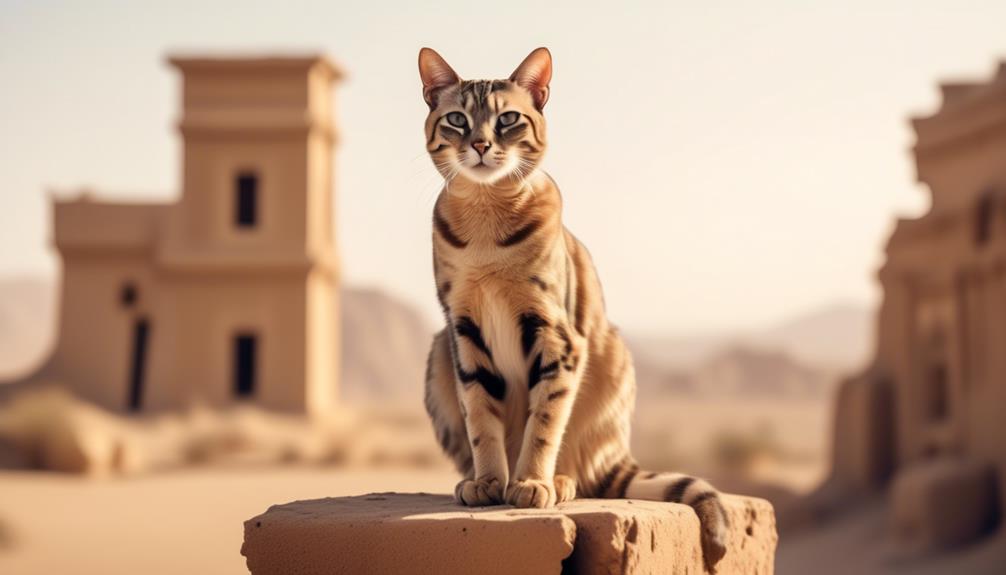
Originating in the Arabian Peninsula, the history of the Arabian Mau cat breed is rooted in the rich cultural heritage of Saudi Arabia and the United Arab Emirates.
Here are some key points about the Arabian Mau’s history:
- The breed is believed to have originated in Saudi Arabia or the United Arab Emirates, although there is speculation about possible African wildcat lineage.
- The Arabian Mau has been popular as a domestic cat in the Middle East for many years.
- It was officially recognized by the World Cat Federation in 2008, highlighting its growing popularity and recognition on an international level.
- Despite its historical significance, the Arabian Mau is also available for adoption in shelters and rescue groups, providing an opportunity for cat lovers to give these unique and culturally significant cats a loving home.
- The Arabian Mau’s history reflects its importance and influence within the Arabian Peninsula, making it a fascinating and cherished breed.
Possible African Wildcat Lineage
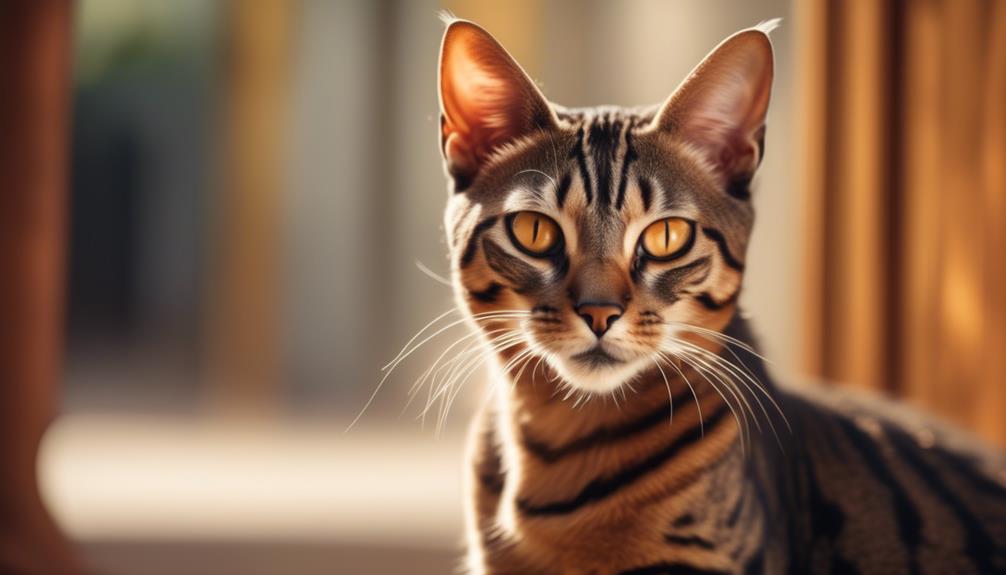
Believed to have ancestral ties to the African wildcat, the Arabian Mau cat breed showcases a potential lineage that adds to its unique heritage.
This connection to the wildcat contributes to the breed’s distinctive characteristics and physical appearance. To further understand the possible African wildcat lineage of the Arabian Mau, let’s examine a comparison between the two in terms of their physical attributes:
| Arabian Mau Cat | African Wildcat |
|---|---|
| Medium-sized, muscular body | Slim and agile body |
| Short, sleek coat with a ticking pattern | Short, dense coat with tabby markings |
| Spotted coat with various colors | Solid-colored coat with a sandy or reddish hue |
| The average weight of 8-12 pounds | Average weight of 8-18 pounds |
Although the Arabian Mau and the African wildcat share some similarities, such as their size and coat patterns, distinct differences set them apart.
Further research and genetic analysis are necessary to fully understand the Arabian Mau’s potential lineage to the African wildcat.
Popularity in the Middle East
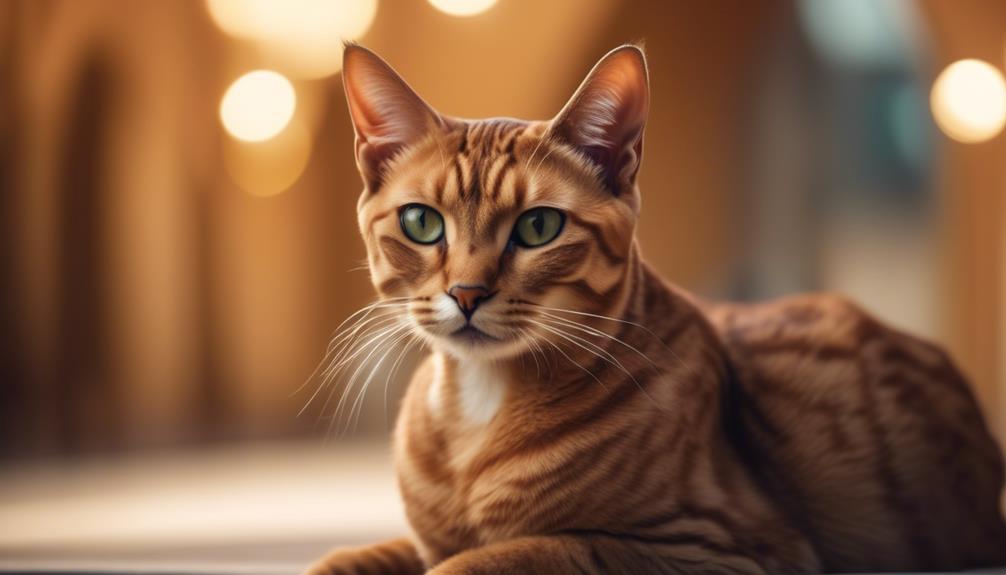
Due to its unique characteristics and distinctive lineage, the Arabian Mau cat breed has gained significant popularity in the Middle East.
Cultural significance: The Arabian Mau is highly regarded in Middle Eastern culture, believed to bring good luck and protection to households.
Adaptability: The breed’s ability to thrive in hot climates makes it well-suited for the Middle East’s arid environment.
Connection to heritage: As an indigenous breed to the Arabian Peninsula, owning an Arabian Mau is a way for people in the region to connect with their cultural heritage.
Low maintenance: The Arabian Mau’s short coat and minimal grooming needs make it an attractive choice for busy individuals or families.
Affectionate companionship: Known for their affectionate and loyal nature, Arabian Maus are excellent companions for individuals and families.
With these factors in mind, it is no wonder that the Arabian Mau has become a beloved and sought-after breed in the Middle East.
Official Recognition by the World Cat Federation
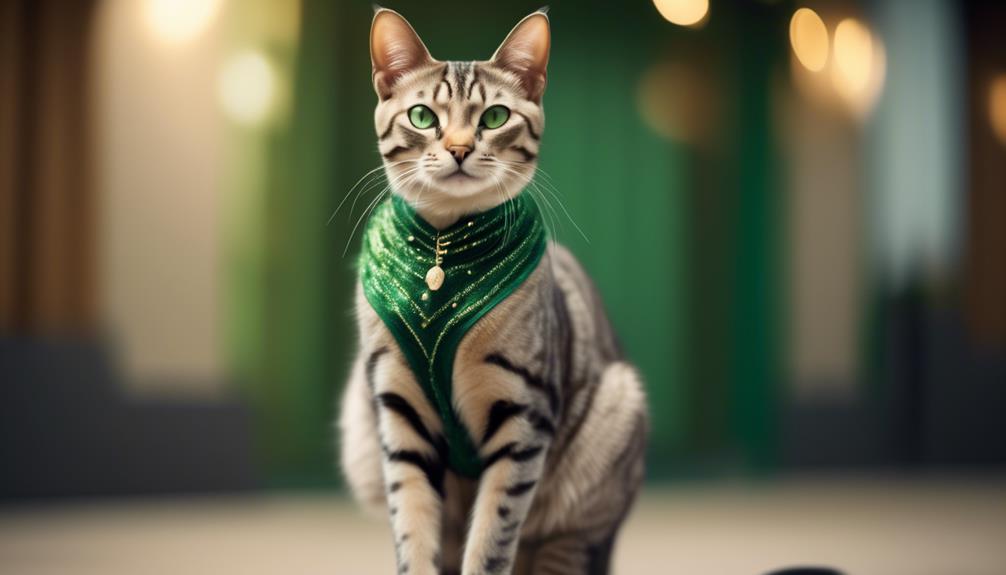
The Arabian Mau cat breed was officially recognized by the World Cat Federation in 2008, solidifying its status as a recognized and valued breed.
This recognition came from the breed’s unique characteristics and increasing popularity.
As a breed, the Arabian Mau has a strong presence in the Middle East and is known for its intelligence, playfulness, loyalty, and affectionate nature.
To provide a deeper understanding of the breed’s recognition, the following table highlights some key details:
| Official Recognition by the World Cat Federation | |
|---|---|
| Year of Recognition: | 2008 |
| Recognition Status: | Officially Recognized |
| Significance: | Establishes breed as a recognized standard |
The recognition by the World Cat Federation has solidified the Arabian Mau’s place as a valued breed, both in the Middle East and worldwide.
Availability for Adoption
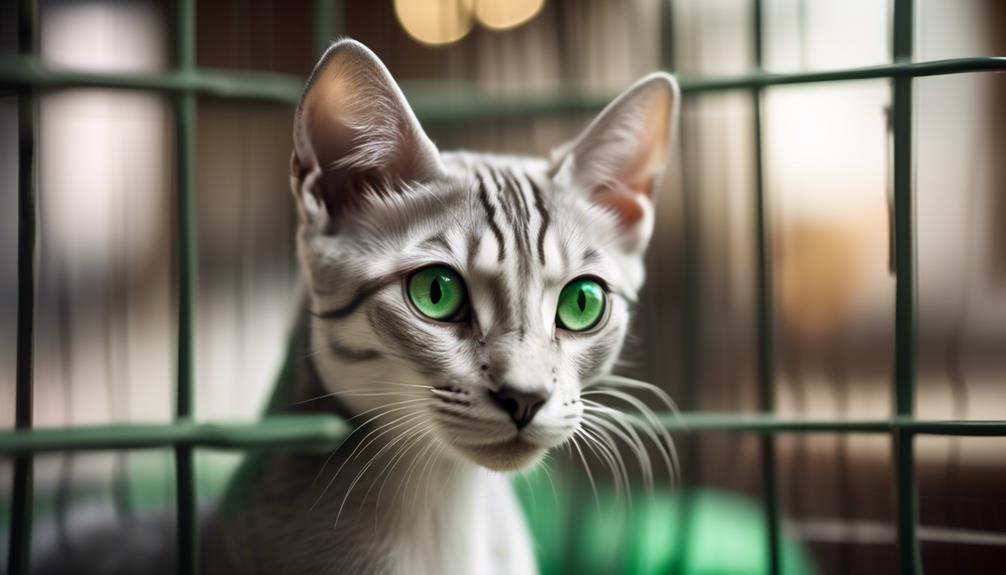
After solidifying its status as a recognized and valued breed through its official recognition by the World Cat Federation in 2008, the Arabian Mau cat breed has gained attention for its availability for adoption.
If you’re considering adopting an Arabian Mau, here are five reasons why it could be a great choice:
- Unique heritage: With its lineage likely stretching back centuries in the Arabian Peninsula, the Arabian Mau carries a fascinating history.
- Loving temperament: Arabian Maus are known for their intelligence, playfulness, loyalty, and affection, making them wonderful companions.
- Moderate exercise needs: These cats enjoy playtime and interactive toys but don’t require excessive exercise.
- Low grooming requirements: With its short, sleek coat, the Arabian Mau only needs brushing once or twice a week to maintain its glossy appearance.
- Health and longevity: Arabian Maus are generally healthy cats with a 12-15-year lifespan, ensuring many years of companionship.
Arabian Mau Characteristics
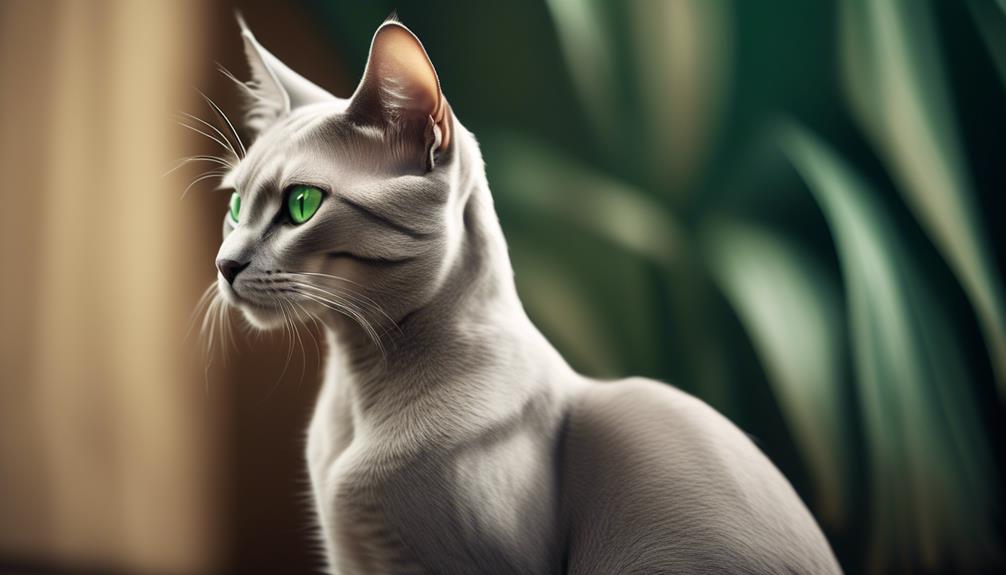
Arabian Mau cats are known for their intelligent, playful, and energetic temperament. They are curious, loyal, and affectionate companions.
With moderate exercise needs, they enjoy interactive playtime and can be trained with positive reinforcement.
Arabian Maus are generally healthy, but there is a potential for genetic health conditions.
It is important to provide them with an active lifestyle, including cat trees and furniture for climbing and exploration.
To keep their minds stimulated, interactive treat toys are recommended. Regular grooming includes weekly brushing to prevent hairballs and maintain a healthy coat.
Arabian Maus come in various coat colors, including black, white, brown, and tabby-style markings. They are adaptable to most climates but prefer warmer conditions.
Intelligence and Playfulness
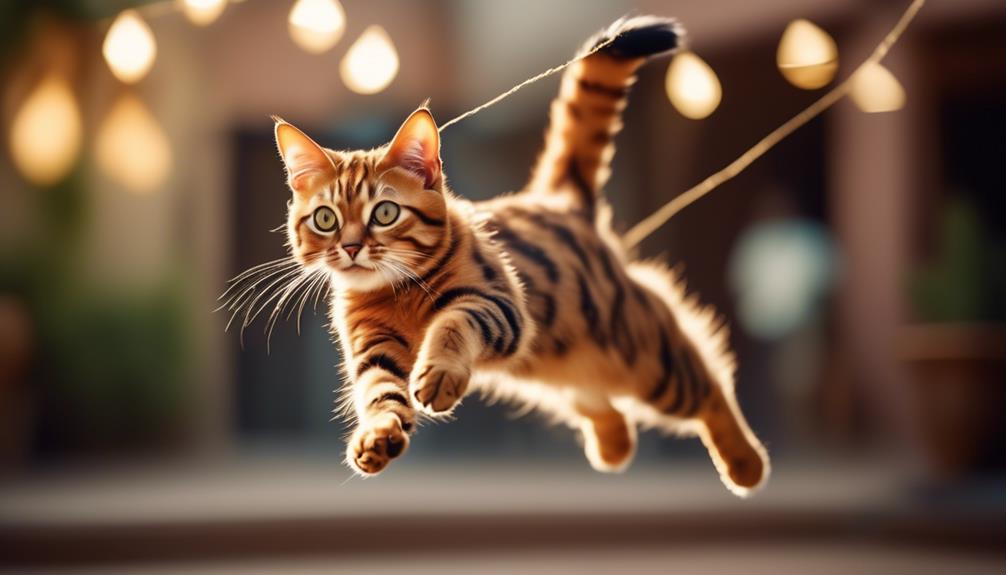
Arabian Mau cats showcase intelligence and playfulness with their inquisitive nature and lively demeanor.
These feline companions possess an innate curiosity that drives their exploration of their surroundings, making them highly intelligent creatures.
Their intelligence allows them to quickly learn and adapt to their environment, making them easy to train using positive reinforcement techniques.
Along with their intelligence, Arabian Maus are known for their playful nature. They enjoy interactive play sessions with their human companions and engage in solitary play with toys and objects around the house.
This playful behavior provides mental stimulation and helps keep them physically fit.
Arabian Mau cats are a delight to have around with their intelligence and playfulness.
Exercise Needs and Trainability
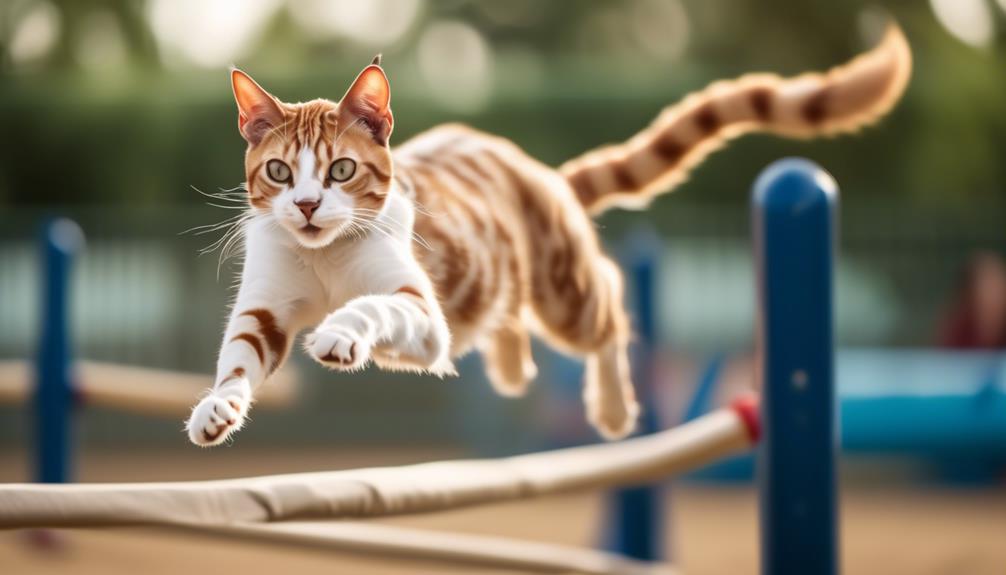
The exercise needs and trainability of Arabian Mau cats are important aspects to consider when caring for this intelligent and energetic breed.
Arabian Maus have moderate exercise needs and thrive in an active lifestyle. Providing them with opportunities to climb and explore, such as cat trees and furniture, is essential for their physical and mental well-being.
Additionally, interactive treat toys stimulate their curious nature and mentally engage them. Arabian Maus can be trained using positive reinforcement techniques, as they are intelligent and eager to please.
Consistency and patience are key when training this breed. Arabian Maus can become well-rounded and obedient companions with regular exercise and training.
| Exercise Needs | Trainability |
|---|---|
| Moderate | High |
Grooming Requirements and Health
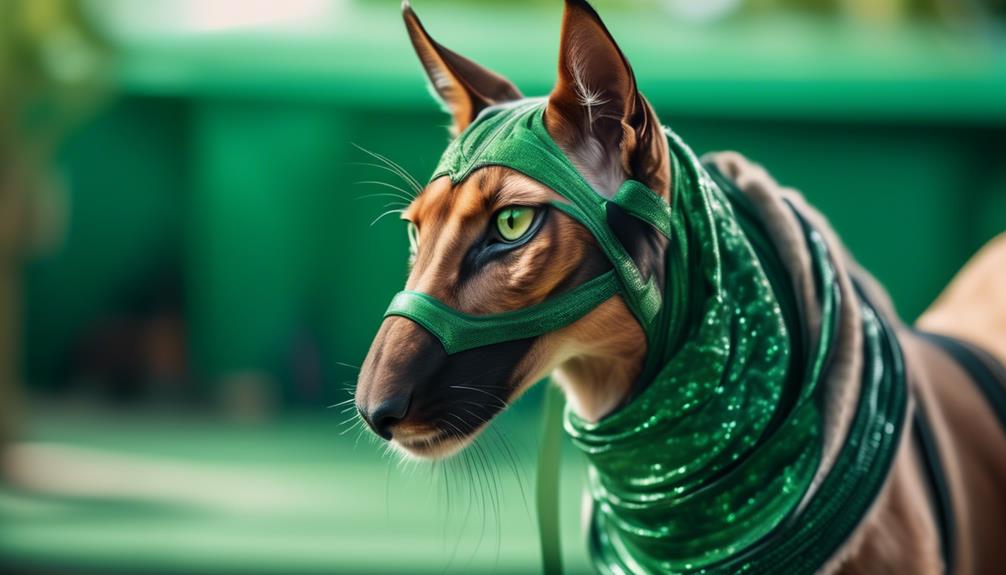
To properly care for the Arabian Mau cat breed, it is important to understand their grooming requirements and potential health concerns.
Here are five key points to consider:
- Arabian Maus have a short, glossy coat that requires weekly brushing to keep it healthy and prevent hairballs.
- They are generally a healthy breed, but like any other cat, they may be prone to certain genetic health conditions. Regular veterinary check-ups are essential to monitor their overall health.
- Arabian Maus are adaptable to most climates, but they prefer warmer conditions. Providing a comfortable environment with appropriate temperature control is important for their well-being.
- Routine nail trimming and ear cleaning are necessary to maintain good hygiene.
- Consult a veterinarian to establish a tooth brushing regimen to ensure optimal dental health.
Care Tips and Climate Adaptability
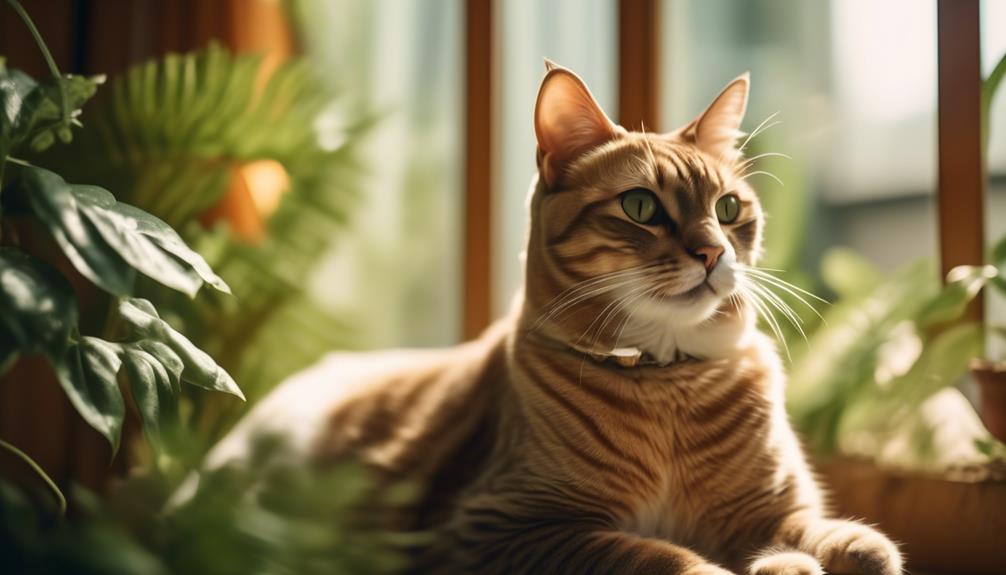
When considering the care of Arabian Maus, it is essential to consider their adaptability to various climates and the specific care tips required to ensure their well-being.
Arabian Maus are generally adaptable to most climates but prefer warmer conditions.
To ensure their comfort, providing them with a suitable environment and taking precautions in extreme weather conditions is important. Here are some care tips for Arabian Maus:
| Climate Adaptability | Care Tips |
|---|---|
| Hot climates | Provide shade and fresh water at all times. Avoid direct sunlight during the hottest parts of the day. Consider using cooling mats or fans to help regulate their body temperature. |
| Cold climates | Provide warm bedding and shelter from drafts. Consider using heated mats or blankets to keep them cozy. Monitor their exposure to cold weather and limit outdoor activities during extreme cold. |
| Humid climates | Ensure proper ventilation and air circulation in their living space. Regularly check for signs of heat exhaustion or dehydration. |
| Dry climates | Keep them hydrated with access to clean water at all times. Consider using a humidifier to prevent dry skin and respiratory problems. |
Frequently Asked Questions
Are Arabian Maus Good With Children and Other Pets?
Arabian Maus can generally get along well with children and other pets. However, it’s important to introduce them properly and supervise interactions. Each cat has its personality, so monitoring their behavior and ensuring a safe and harmonious environment is crucial.
How Often Should Arabian Maus Be Taken to the Vet for Check-Ups?
The frequency of veterinary check-ups for Arabian Maus depends on their age, overall health, and specific medical conditions. Generally, it is recommended to schedule annual check-ups but consult with a veterinarian for personalized advice.
Does Arabian Maus Have Any Specific Dietary Needs or Restrictions?
Arabian Maus do not have any specific dietary needs or restrictions. However, providing a balanced diet appropriate for their age, weight, and activity level is important. Consulting with a veterinarian is recommended for personalized dietary recommendations.
Is Arabian Maus Prone to Any Specific Health Conditions?
While Arabian Maus are generally healthy, like all cat breeds, they may be prone to certain health conditions. It is recommended to consult with a veterinarian for specific concerns and to ensure their well-being.
Can Arabian Maus Be Left Alone for Long Periods?
Like any cat, Arabian Maus can become lonely and bored if left alone for long periods. Providing them with mental stimulation, toys, and a suitable environment to prevent behavioral issues is important.
Conclusion
In conclusion, the Arabian Mau cat breed is a medium-sized landrace breed known for its short, sleek coat and unique ticking pattern.
With its origins in the Arabian Peninsula and a possible lineage to the African wildcat, Arabian Maus have gained popularity as domestic cats in the Middle East.
Known for their intelligence, playfulness, and loyalty, they require moderate exercise and can be trained using positive reinforcement techniques.
With their adaptable nature and low grooming needs, Arabian Maus make great companions in various climates.




